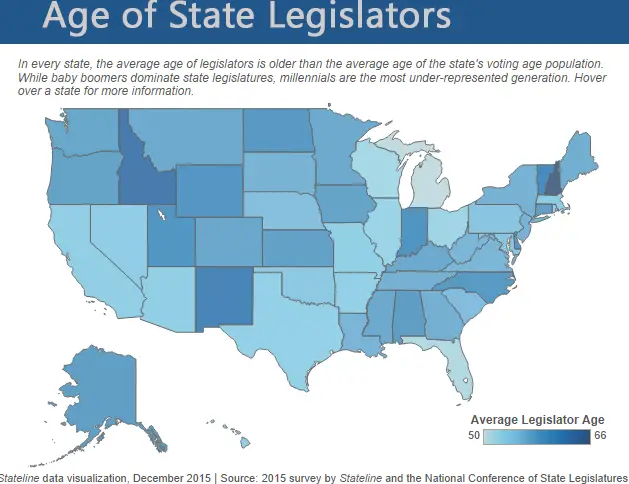
State lawmakers across the U.S. are older than their constituents, an imbalance that might be tilting policymaking toward the interests of seniors and away from the country’s largest living generation: millennials.
The average age of lawmakers in the 50 states is 56, putting a majority of them in the baby-boom generation, which started coming of age politically in the 1960s and ’70s, according to a new survey by Stateline and the National Conference of State Legislatures. It’s higher in some states, such as New Hampshire, where the average age is 66, and Idaho, where it’s 63. The average age of the U.S. voting population, meanwhile, is 47.
Millennials, those born after 1980 who entered adulthood at the turn of the century, hold just 5 percent of state legislative seats, while comprising 31 percent of the U.S. voting-age population. Millennials recently became the largest living generation.
Millennials in the early stages of their professional lives are less apt to run for office than older people who are more settled in their careers or are nearing retirement. The problem, some political scientists say, is that when younger legislators are left out, so are their viewpoints.
Older legislators — who also tend to be wealthier — may be less likely to focus on issues such as school spending and student loan debt. Too much gray hair in a legislative body also leaves some younger voters feeling disconnected from the political process.
The result may be a self-perpetuating cycle. Michael McDonald, an associate professor of political science at the University of Florida, said while there are few young faces in the legislatures, there are even fewer at the polls, where turnout among young voters is “abysmally low.” Census datashows 23 percent of millennials voted in the 2014 elections compared with 59 percent of those 65 and older.
“If state legislators don’t perceive young people to be engaged, they’re not going to be standard-bearers for the issues young people care about,” he said.
![]() A legislator’s political outlook can be colored by his or her stage of life and by generational experiences. Millennials, for instance, are more likely to be single. They have higher levels ofstudent loan debt, poverty and unemployment, and lower levels of wealth and personal income than their predecessor generations had at the same age.
A legislator’s political outlook can be colored by his or her stage of life and by generational experiences. Millennials, for instance, are more likely to be single. They have higher levels ofstudent loan debt, poverty and unemployment, and lower levels of wealth and personal income than their predecessor generations had at the same age.
Politically, they expect to get less from government programs such as Social Security. Those with young children are more interested in funding public education than older people whose children are grown, and who may be reluctant to pay higher taxes to support schools.
Millennials also are more racially diverse than older generations, and more socially liberal. Sixty-nine percent of millennials favor legalizing marijuana, for instance, while 52 percent of boomers do.
That diversity, however, may not show in the legislature. Ruth Mandel, director of the Eagleton Institute of Politics at Rutgers, found there are far more young men serving as state legislators than women. The career and family concerns that keep young people from running for office tend toimpact women more.
In Nebraska, where millennials make up 16 percent of the Legislature — higher than in any other state — younger lawmakers “know what’s going on with families,” said Republican state Sen. Beau McCoy, a 35-year-old father of four. “We have careers. We multitask. When you’ve been newly married, raising kids, have a small business — we understand very well the things we have worked on.”
In New Hampshire, state Rep. Travis Bennett, a 23-year-old college senior at Plymouth State University, thought it important to speak out on behalf of his fellow students against a bill instituting a 30-day residency requirement to register to vote. He said the measure would have dampened the political participation of college students. Members of the New Hampshire General Court, the oldest state legislators in the country, approved the bill, but Democratic Gov. Maggie Hassan vetoed it. Bennett, who is slated to graduate this year, said he doesn’t plan to run again, in part because of the low pay — in New Hampshire legislators earn $100 a year — and the challenges of finding a flexible job that would allow him to be in the legislature.
But most issues that confront states cross generational boundaries. In Maine, for instance, many young people are leaving the state in search of greater economic opportunity elsewhere. It’s an issue that affects older Mainers as well as millennials, said state Rep. Ryan Fecteau, a 23-year-old Democrat.
The departure of young residents shrinks the state’s tax base, which creates a greater property tax burden on elderly homeowners. It also makes it harder for retirees to sell their homes. In response, Fecteau introduced a bill to help those with student loan debt get into their first home by reducing some of their debt, though it did not pass the Senate.
“Having young people at the table is just as important on issues that are straining seniors,” he said.
–Rebecca Beitsch, Stateline
![]()






























Lin says
“If state legislatures don’t perceive young people to be engaged…”
They are not engaged as evidenced by the 23% voting turnout.
Brad W says
As this article points out that the average age of voters is 47. That age group is Gen X and not Millenials. So why is this generation skipped over? Why does everyone keep focusing on Millenials and completely forget about the gen x’ers who are those employee and the real middle class?
Sherry says
Here’s some perspective on generation X from socialmarketing.org:
Generation X
Born: 1966-1976
Coming of Age: 1988-1994
Current Population: 41 million
Sometimes referred to as the “lost” generation, this was the first generation of “latchkey” kids, exposed to lots of daycare and divorce. Known as the generation with the lowest voting participation rate of any generation, Gen Xers were quoted by Newsweek as “the generation that dropped out without ever turning on the news or tuning in to the social issues around them.”
Gen X is often characterized by high levels of skepticism, “what’s in it for me” attitudes and a reputation for some of the worst music to ever gain popularity. Now, moving into adulthood William Morrow (Generations) cited the childhood divorce of many Gen Xers as “one of the most decisive experiences influencing how Gen Xers will shape their own families”.
Gen Xers are arguably the best educated generation with 29% obtaining a bachelor’s degree or higher (6% higher than the previous cohort). And, with that education and a growing maturity they are starting to form families with a higher level of caution and pragmatism than their parents demonstrated. Concerns run high over avoiding broken homes, kids growing up without a parent around and financial planning.
DefenderOfTheSecond says
Of course millennials voices aren’t being heard, have you ever listened to their political viewpoints? Yes, I am a millennial myself at 25 years of age, but I do not think like such. You want to know why there are no young legislators? They are barely capable of taking care of a goldfish, and you people think that they should be able to contribute to the functionality of a government body? It’s bad enough that we have socialist progressives in the White House who have made gay marriage legal, passed healthcare laws that make a mockery of our intelligence. What this article fails to inform it’s readers, is that the millennials support those ideas 100%.
Sherry says
@ defender of the second Ahhhh. . . I see, if, as you say, the vast majority of “Millennials” have a different political view point than yours, it is all of them that are “barely capable of taking care of a goldfish”. Wow. . . how very open minded and astute of you. . . NOT!
Brad W says
Sherry,
That’s an interesting source, but with all due respect I personally prefer non-opinioned credible sources (i.e. “the worst music”?). Pew Research for example, provides a great overview of who and where Gen X sits among the issues. You can find that article at http://www.pewresearch.org/fact-tank/2014/06/05/generation-x-americas-neglected-middle-child/
The bottom line to it all is that Gen X is who really needs to be looked to for leadership to truly bridge the gap as they are closer in age and issues. 25 – early-30 somethings don’t possess the life experience and perspectives to lead right now. They tend to have a thought process of “do whatever you want” and “let the government provide” as evident in the research noted above. Gen X being more experienced and because of what we have lived through know we need to provide for ourselves. Unfortunately we get drowned out in between two very large groups (Gen X’ers only span 16 years whereas the others span 20 years).
Sherry says
Happy almost New Year, Brad. . . you are absolutely correct. . . Pew is always a most credible source. . . thanks for the link. . . great insights!
Looking forward to more “open minded” and tolerant political leadership from the next generations. The world is quickly changing and becoming much more diverse. . . our leaders really need to understand that fundamental fact and embrace the inevitable. I am also hoping the next generations will become much more involved in the political process. If we do not stridently make our votes count and our voices heard, the greedy 1% Billionaires and will increase their power to the point that the common citizen of the USA will have no voice at all!